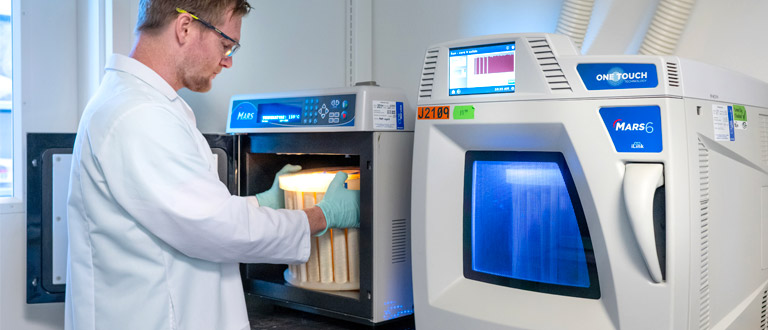Heavy Metals vs. Metals Test

The Importance of Metal Testing in Food Products
Many food products contain naturally occurring metals, some of which offer nutritional benefits. The human body requires certain metals in precise amounts for optimal function. However, excessive levels of certain metals, especially heavy metals, are harmful. Medallion Labs provides metal and heavy metal testing to ensure food safety and accurate nutritional labeling. Tests for calcium, iron, and sodium are among the most frequently requested, crucial for verifying nutritional content.
Why Do Metals Occur in Food?
Metals in food originate from various sources:
- Natural Occurrence: Some metals are naturally present in food products.
- Contamination: Many metals, particularly heavy metals, result from contamination. Common sources include:
- Soil contamination
- Chemical fertilizers and pesticides
- Industrial pollution
- Water contamination
- Food Chain Accumulation: Heavy metals bioaccumulate. Fish, for example, can absorb heavy metals from contaminated water, posing a risk to consumers.
- Intentional Fortification: Some metals, like iron, are added to enhance nutritional value.
Understanding Metal Categories in Food Testing
For food testing, metals are categorized as:
- Core 9 Elements: These essential metals are frequently listed on nutrition labels and are often sold as supplements. FDA approval often requires testing for calcium, iron, phosphate, and sodium (all part of the Core 9). The Core 9 elements include:
- Potassium
- Iron
- Calcium
- Sodium
- Copper
- Phosphorus
- Magnesium
- Manganese
- Zinc
- Trace Elements: The body needs these metals in smaller quantities than the Core 9. Testing is typically only required to meet FDA or EPA regulations.
- Aluminum
- Boron
- Barium
- Chromium
- Cobalt
- Molybdenum
- Nickel
- Antimony
- Selenium
- Tin
- Heavy Metals: Heavy metals are a subset of trace elements, characterized by high density and toxicity at low exposure levels. A heavy metals test typically focuses on:
- Mercury
- Lead
- Arsenic
- Cadmium
Medallion Labs' Metal Testing Options
Medallion Labs offers three metal testing options:
1. Heavy Metals Package Test: This test analyzes:
- Mercury
- Lead
- Arsenic
- Cadmium
Sample Preparation: When testing for arsenic, cadmium, and lead, samples are prepared by microwave closed vessel digestion with nitric acid. Solutions are infused into an ICP-MS instrument to perform identity and quantitation based on the linear response of the elements using calibration standards containing the elements with internal standards.
When testing for mercury, solid or liquid samples are dried and thermally decomposed in a continuous flow of oxygen, and the combustion products are passed over a hot catalyst bed. The remaining decomposition products are carried to a gold amalgamator that selectively traps mercury. After the removal of any remaining gasses or decomposition products, the amalgamator is rapidly heated to release the mercury in vapor form. The vaporous mercury is analyzed using atomic absorption spectrophotometry at 245 nm with quantitation as compared to a calibration curve.
2. Metals Screen I Test: This cost-effective test analyzes:
- Potassium
- Iron
- Calcium
- Sodium
Sample Preparation: Solutions are infused into an ICP OES and quantified based on an external standard calibration curve..
3. Metals Screen II Test: This comprehensive test analyzes:
- Potassium
- Iron
- Calcium
- Sodium
- Copper
- Phosphorus
- Magnesium
- Manganese
- Zinc
Sample Preparation: Microwave closed-vessel digestion with nitric acid; ICP-OES analysis.
Sample Restrictions and Testing Limitations
Due to the use of microwave digestion, Medallion Labs does not analyze supplements, oils, glycerin, or alcohols. All tests report total metal content and do not differentiate between sources (e.g., sodium from various sources). Arsenic speciation testing is not offered. Cosmetic testing is also not performed.
ICP-OES vs. AAS
While atomic absorption spectroscopy (AAS) is commonly used for metal testing, Medallion Labs utilizes Inductively Coupled Plasma Optical Emission Spectroscopy (ICP-OES) for its superior speed and precision. ICP-OES measures emitted light, while AAS measures absorbed light.
Contact Medallion Labs
For detailed information, technical data sheets, and online ordering, please visit medallionlabs.com. Contact us at 1-800-245-5615 to discuss your specific testing needs. Medallion Labs is ISO accredited and committed to providing accurate and efficient metal testing services.
Let's Get to Work!
Submit your order online and ship your samples today. If you have questions, we are always here to help.
Medallion Labs+
A food testing program designed with mid-market and enterprise food and ingredient manufacturers in mind.